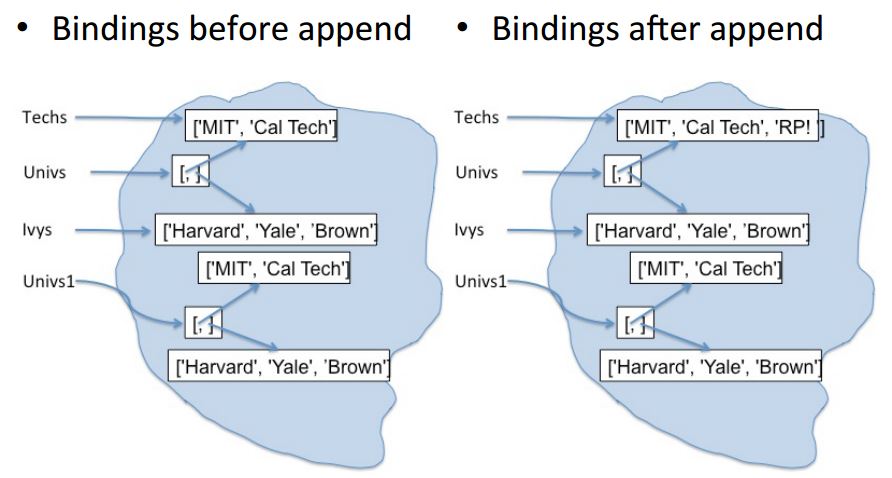1. tuples:
(3) -> 3 but (3,) indicates a tuple -> (3,)
2. tuples and lists:
tuples:num = (1,2,3) (3,) 不可修改 num(1) = 4 -> 'error' can
lists:num = [1,2,3] [3] 可以修改 num[1] = 4 -> [1,4,3] cannot be used as keys
You can’t use lists as keys, since lists can be modified in place using index assignments, slice assignments, or methods like append() and extend().
. ## universities
## universities
Techs = ['MIT', 'Cal Tech']
Ivys = ['Harvard', 'Yale', 'Brown']
Univs = [Techs, Ivys]
Univs1 = [['MIT', 'Cal Tech'], ['Harvard', 'Yale', 'Brown']]
Techs.append('RPI')
print('Univs = ')
print(Univs)
print('')
print('Univs1 =')
print(Univs1)
for e in Univs:
print('Univs contains ')
print(e)
print(' which contains')
for u in e:
print(' ' + u)
4. list.append: side affect but '+' creates a new list
5. Avoid mutating a list over which one is iterating
def removeDups(L1, L2):
for e1 in L1:
if e1 in L2:
L1.remove(e1)
L1 = [1,2,3,4]
L2 = [1,2,5,6]
removeDups(L1, L2)
print(L1)
"""
Inside for loop, Python keeps track of where it is in list using internal counter
When we mutate a list, we change its length but Python doesn’t update counter
"""
//Better is to clone
def removeDupsBetter(L1, L2):
L1Start = L1[:] //Do not use L1Start = L1, not efficient
for e1 in L1Start:
if e1 in L2:
L1.remove(e1)
L1 = [1,2,3,4]
L2 = [1,2,5,6]
removeDupsBetter(L1, L2)
print(L1)
6. Difference
alist = range(1,6)
blist = alist
print alist
print blist
alist[2] = 'hello'
print alist
print blist
//alist == blist for blist binds to alist
clist = range(1,6)
dlist = []
for num in alist:
clist.append(num)
print clist
print dlist
clist[2] = 'hello'
print clist
print dlist
// clist != dlist
7. map(function, iterable, ...)
Apply function to every item of iterable and return a list of the results.
8. error
monthNumbers = {‘Jan’:1, ‘Feb’:2, ‘Mar’:3, 1:’Jan’, 2:’Feb’, 3:’Mar’}
monthNumbers[‘Jan’] returns 1 but monthNumbers[1] can't returns ‘Jan’ 'error'